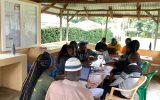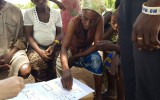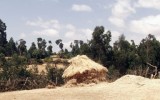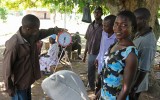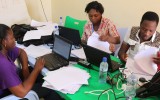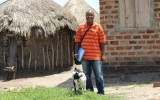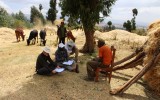Monitoring and evaluation
Showing items 1 to 15 of 20
View Categories
- Areas of expertise
- Capacity building
- Climate change
- Data
- Disasters and emergencies
- Famine prevention and food security
- Gender
- Income diversification
- Inequality
- Lake Victoria fisheries
- Livelihood resilience
- Livelihood Zones
- Livelihoods
- Monitoring and evaluation
- Nutrition and health
- Open source
- Policy and programme design
- Post-conflict
- Poverty research
- Refugees and displacement
- Social protection
- Technology
- Urban
- Vulnerability assessment
- Countries
- Hydromet
- Methods
- Resilience
- The organisation
-
New insights from latest EfD / Nasio Trust IHM study in Kenya
Assessment of household livelihoods in Mumias West Sub County, Kakamega County, Kenya. Climate change means farmers need to adapt and the Nasio Trust is taking on this challenge, supported by new insights that IHM studies are providing. Building on EfD’s initial training Nasio’s local staff team re-visited households interviewed last year (see report here) allowing […]
-
Considering the health sector as an important user of Hydromet information
In September, I was able to attend the AMCOMET, African Ministerial Conference on Meteorology, forum in Addis Ababa. The focus of the forum was Weather, Water, and Climate Services, and the contribution of these ‘hydromet’ services to wider social and economic development is becoming increasingly evident as the reality of climate change hits both urban […]
-
Postcard from Ethiopia: How to measure our impact
As an economist, I have always found it logical that NGOs should be expected to demonstrate the impact of their work. Once we have set our objectives, we need to know whether we are achieving them and how we might do better. That means measurement. At Farm Africa, we support smallholder farmers to increase their […]
-
Six challenges and opportunities for a better post-2015 development data revolution
The data revolution in international development continues to draw attention and take shape as the third annual International Conference on Financing for Development approaches in Addis Ababa this July. At Evidence for Development, the pursuit of strong data and baselines for programme design, monitoring and evaluation is central to our work in measuring and supporting […]
-
Livelihood baseline assessment of Malian refugees in Burkina Faso: Quantitative analysis of household economies (2014)
This assessment was undertaken on behalf of UNHCR to provide baseline information on the livelihoods of Malian refugees in Burkina Faso, to identify opportunities for greater economic self-reliance, and to highlight risks and vulnerabilities of specific groups within the population. This report covers the three official refugee camps in Burkina Faso: Sag Nioniogo, Goudebou and Mentao.
-
Mobile data, measurement & evidence… what’s new?
As mobile data collection in remote regions and developing countries becomes more viable for development organisations, the robustness of the methodologies used must be considered in relation to the goal of evidence-based development. Expanded possibilities According to the UN International Telecommunication Union, “by the end of 2014, 55% of all mobile-broadband subscriptions are expected to […]
-
Oiling the relationship between evidence and policy: prioritising data quality and integrity
LSE’s recent JSRP conference on politics and evidence in international development highlighted problems inherent in the ways ‘evidence’ tends to be defined and used in mainstream development discourse and practice. How can Evidence for Development’s individual household method (IHM) and current involvement in the ‘Assessing Rural Transformations’ project inform the discussion and help to oil […]
-
Aid impact assessment and agricultural change: Researching ‘good enough’ qualitative approaches
Using public money to reduce global poverty is a tough enough ‘task’ even without having to account for each pound spent every five minutes. But aid professionals can hardly claim to be less susceptible to self-serving group-think than anyone else, and indeed the case for strong reality checks on aid expenditure will remain particularly strong […]
